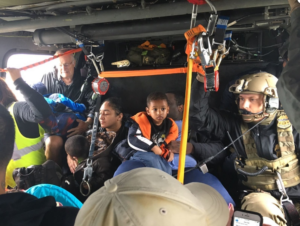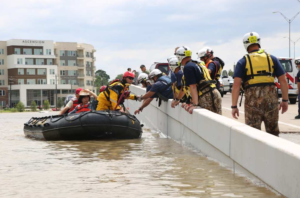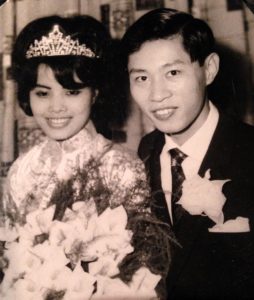By Bao-Long Chu, Program Officer, Houston Endowment
Stories and storytelling are powerful tools. Stories can help a community explain who they are, what they want and why it matters.

After a disaster, stories provide a way for people to feel that they have control over the world, see patterns where there is chaos, and meaning where there is randomness. Storytelling after trauma can help survivors to get on a path toward healing and to resurface from loss onto a new shore.
In 1954, my parents – along with nearly one million northerners – took to the rain-soaked roads from Hanoi and fled south when Vietnam was partitioned by the Geneva Accords. In 1975, my family was airlifted out of Saigon two days before the fall of that lush city. We were spared from joining the estimated 1.5 million boat people who fled Vietnam, many of whom took to the open sea in makeshift boats.
Moving from loss to loss, my parents told stories to build hope and grit in us. I am a poet because I believe that collecting and amplifying their stories is critical for my family. Our stories are not unique, but my telling gives us a voice. The post-war stories and poems from colleague writers of my generation, those who have crossed oceans, grown up in America and been fed by storytelling, have filled bookshelves for many years.
In the early morning of August 27, 2017, my parents faced another loss – they were rescued and carried through two feet of water inside their house onto a skiff. Hurricane Harvey’s relentless rain had inundated theirs along with thousands of other homes across the upper Texas coast. Their rescue was one of many that was carried out by a fleet of resident responders from makeshift boats. The images of the volunteer flotilla began to merge with those of boat people in my head.

The idea to collect Harvey stories began in conversations, even before the water receded, with my program officer colleagues as we were discussing how to support vulnerable communities. Providing a platform to gather and amplify stories about what it means to survive as a Houstonian, especially to elevate the voices of those not often heard, aligns with our priority of equitable arts engagement and our recognition that stories can build civic attachment and empathy.
Houston Endowment funded the Houston Flood Museum (HFM) based on a concept by Rice University creative-writing professor Lacy M. Johnson, a memoirist who writes about justice and life after trauma. HFM exemplifies the synchronicity of grantmaking and a grantor-grantee relationship in which shared goals, trust and empathy translate resources into impact. (Read more here and here about its evolution.)
Not a traditional brick-and-mortar museum, HFM is an online, community-driven platform. The museum opened its virtual doors in August 2018 with current exhibitions that contain nearly 1,200 artifacts – a wide range of personal photographs; commissioned art; satellite images; letters from students, videos and podcasts from Houston Public Media; essays in Spanish and English; recorded meditations from Rothko Chapel; and written and performance poetry, including “A Poem for Houston” by Houston Poet Laureate Deborah D.E.E.P Mouton. Beyond the perspectives from elected officials, local heroes, civic and nonprofit leaders, the goal to elevate the voices of everyday Houstonians is fully realized with stories Gloria, Edwardo, Erika, Briana and many others.

As my parents taught me, stories after a disaster do not have an expiration date, thus the work of collecting is ongoing for HFM. Through partnerships with Harvey Memories Project, a consortium of 30 librarians, archivists and data scientists (representing Rice University, University of Houston, Houston Public Library and Harris County Public Library), and several literary and visual arts groups such as FotoFest, Inprint, Writers in the Schools and Writespace, HFM is working in communities to acquire artifacts. New exhibitions are anticipated periodically.
HFM represents a fresh approach to acquisitions and accessibility, which has generated interest from the field of museums. The Jefferson County Memorial Project and Smithsonian National Museum of American History recently contacted Johnson, who leads the project with an advisory board of community stakeholders, to learn more about HFM. Research shows that many small history museums struggle with dwindling visitation and revenues; outsized expenses from maintaining historical assets; and diminished relevance in the face of demographic change and competing interests. Currently, Houston Endowment supports a capacity-building project from the Texas Association of Museums that aims to encourage a cohort of small local history museums to consider and implement “alternative futures,” which may include a model like HFM.
Why do stories matter to communities, and why should funders support storytelling? The answer lies in media scholar George Gerbner’s quote: “Whoever tells the stories of a culture defines the terms, the agenda, and the common issues we face.” If we follow this assumption, then whose stories we hear is intertwined with all the pillars of our work to advance equity and enhance vibrancy. Equitable stories are essential to a healthy, sustainable and just society.
About the Author
 Bao-Long Chu oversees grantmaking for the majority of the Houston Endowment’s arts and culture portfolio. Prior to joining Houston Endowment in 2015, Long was associate director of the literary-education nonprofit Writers in the Schools (WITS) where he developed his extensive background in literacy, arts, and community engagement and worked in collaboration with a wide variety of Houston-area institutions and organizations, including Art League Houston, Houston Grand Opera, Texas Children’s Hospital and University of Houston Moores School of Music. Long has also written and presented extensively on writing pedagogy, the connection between art and the refugee experience, and non-profit programming. Originally from Vietnam, Long earned a Bachelor of Arts degree in English and psychology from Houston Baptist University and a Master of Fine Arts degree in creative writing from the University of Houston Creative Writing Program. His poems and essays have been published in several anthologies, including The New Anthology of American Poetry: Postmodernisms 1950-Present and From Both Sides Now: The Poetry of the Vietnam War and Its Aftermath. His libretto for HGO’s East + West initiative, Bound, premiered in 2014. Long has served on the boards of DiverseWorks and Gulf Coast: A Journal of Literature and Fine Arts.
Bao-Long Chu oversees grantmaking for the majority of the Houston Endowment’s arts and culture portfolio. Prior to joining Houston Endowment in 2015, Long was associate director of the literary-education nonprofit Writers in the Schools (WITS) where he developed his extensive background in literacy, arts, and community engagement and worked in collaboration with a wide variety of Houston-area institutions and organizations, including Art League Houston, Houston Grand Opera, Texas Children’s Hospital and University of Houston Moores School of Music. Long has also written and presented extensively on writing pedagogy, the connection between art and the refugee experience, and non-profit programming. Originally from Vietnam, Long earned a Bachelor of Arts degree in English and psychology from Houston Baptist University and a Master of Fine Arts degree in creative writing from the University of Houston Creative Writing Program. His poems and essays have been published in several anthologies, including The New Anthology of American Poetry: Postmodernisms 1950-Present and From Both Sides Now: The Poetry of the Vietnam War and Its Aftermath. His libretto for HGO’s East + West initiative, Bound, premiered in 2014. Long has served on the boards of DiverseWorks and Gulf Coast: A Journal of Literature and Fine Arts.
The Funders’ Network is happy to share news and original content from our members and partners. If you’s like to suggest or contribute a blog post, please reach out to Director of Communications Tere Figueras Negrete.
